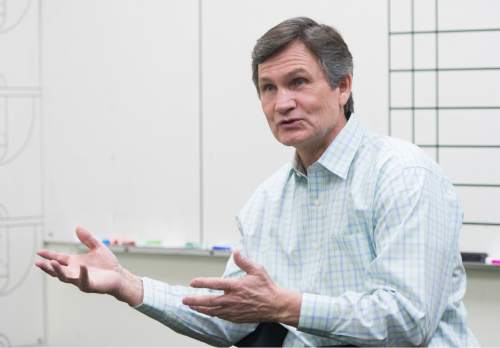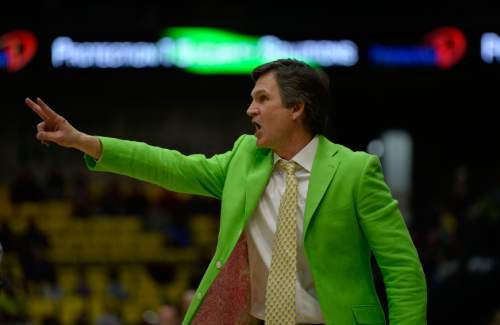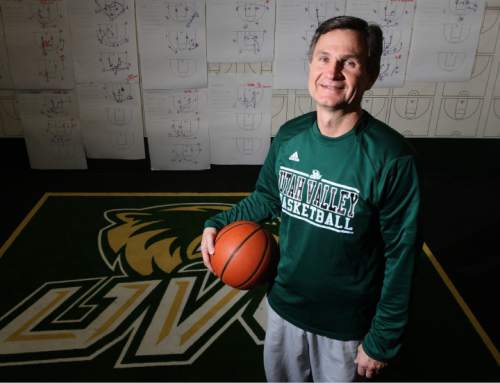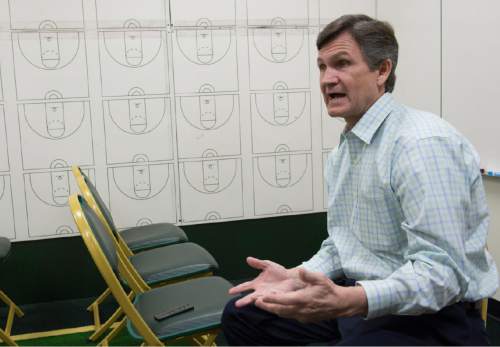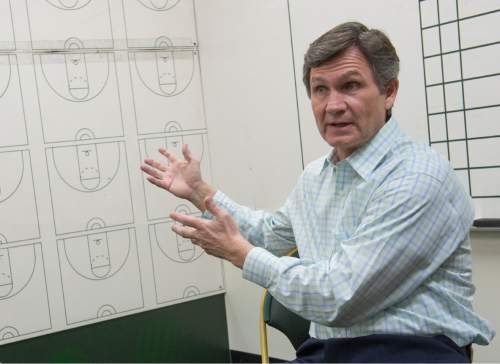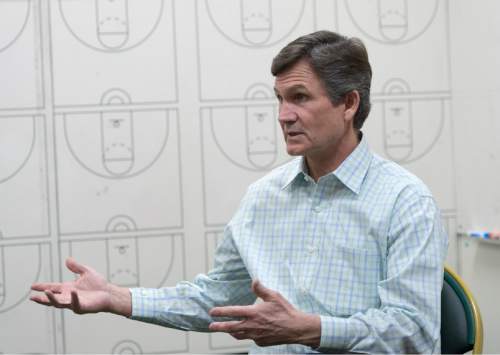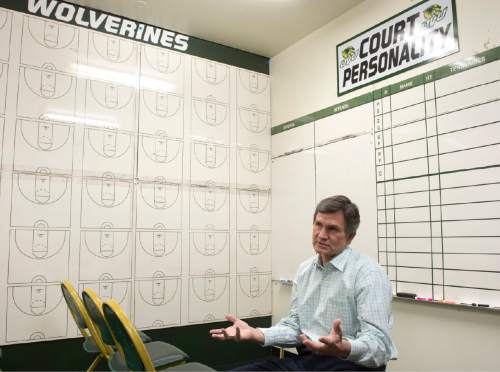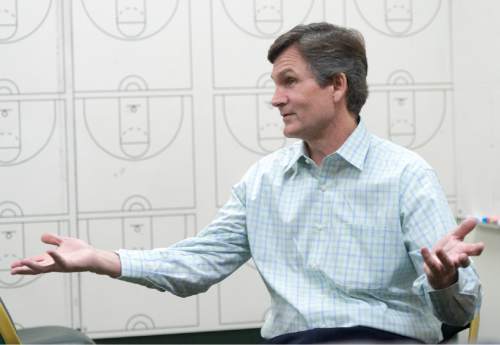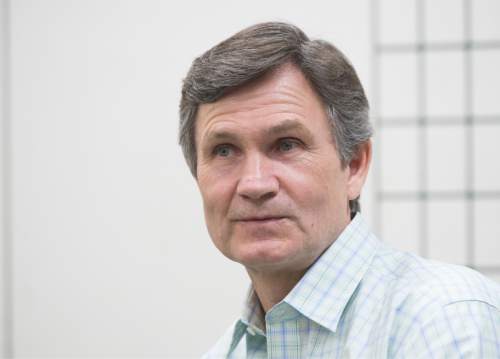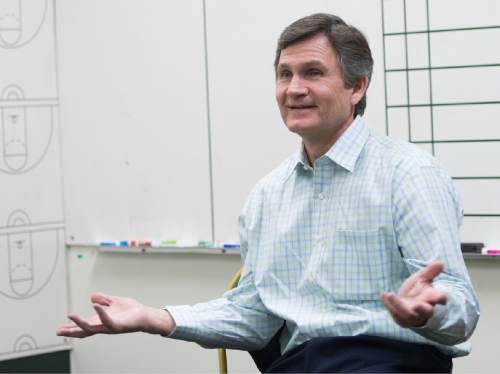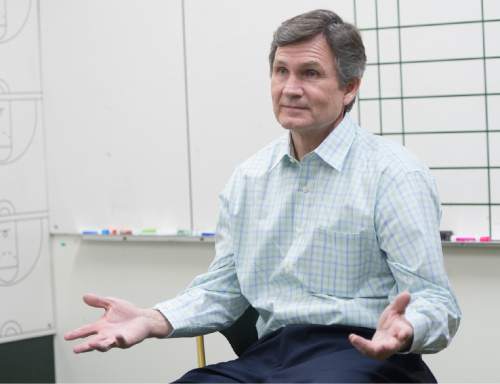This is an archived article that was published on sltrib.com in 2015, and information in the article may be outdated. It is provided only for personal research purposes and may not be reprinted.
Orem • If he cursed even once, or if he raised his voice other than to be heard above the din at the UCCU Center, it happened while his team huddled on the court for timeouts, his players shielding him.
He didn't pace. He wasn't overly animated. He either stood with his arms folded or, when the action was at the far end, sat in a catcher's crouch beside the scorer's table.
Occasionally, he'd turn to his bench and tap a few players.
"You. You. You."
And they'd check in.
On the night of March 7, Utah Valley head coach Dick Hunsaker didn't act like a man who has walked the line between tough love and verbal abuse, as some believe, or who'd been instructed by his superiors a year earlier to find a place to cool off when he felt overcome by emotion.
The only thing shocking about Hunsaker's behavior happened after his Wolverines had defeated CSU Bakersfield in their regular season finale, when athletic director Vince Otoupal and Vice President Val Peterson met Hunsaker by the court entryway to exchange the usual pleasantries, and he ushered them back to the locker room.
There, Hunsaker explained that after 13 years as Utah Valley's head coach — after going 232-159 and leading the Wolverines from junior college to Division I independent to Western Athletic Conference champion — he intended that night to announce that he'll step down when his contract expires at the end of June.
If the timing was OK with them, that was.
"My family's here, and I'd really appreciate that," he told Otoupal.
"I said, 'Coach, if this is the way you want to do it, then I'm in full support,'" Otoupal said. "'You've earned that.' "
And so Dick Hunsaker went.
Quietly.
Tough • There exists a myth that while Hunsaker led Utah Valley to unprecedented successes, the ticket office sat families far from the home bench, where his wrath could be seen but not heard.
Such stories have legs in Orem, self-styled as "Family City USA" and under 5 miles from where Brigham Young head coach Dave Rose enjoys a reputation as a consummate gentleman.
When Otoupal became AD in mid-2013, people told him Hunsaker "yells, he yells a lot, and he makes really goofy faces" — the latter charge leveled by a passerby at a golf course clubhouse who'd noted Otoupal's UVU attire.
"He was right," Otoupal said. "Coach does. He makes some goofy faces. And he can certainly fill up the gym with his voice, there's no doubt about that."
Many will know Hunsaker as "the Majerus guy": He coached under and succeeded Rick Majerus at both Ball State and Utah, and was described as a "Mini-Majerus" by then-U. guard Jeff Johnsen during his interim stint running the team in 2000-01.
But his biggest influence, Hunsaker said, was UTEP legend Don "The Bear" Haskins. Even though Hunsaker played just one season for Haskins before transferring to Weber State, he was "like a little duckling," he said. "It just was at the psychological imprinting stage."
He used three words to summarize Haskins' priorities: "Tough, fair and care."
He's yelled, he freely admits, but he doesn't believe he has been unfair or uncaring.
Said UVU associate athletic director Clint Burgi: "We've all heard the Majerus stories. ... There's nothing I've heard [about Hunsaker] that comes close to those Majerus stories."
Still, before Hunsaker's March 7 announcement, The Salt Lake Tribune learned that some players who left the program in recent years had felt mistreated, and that some felt Hunsaker was unlikely to be offered a new contract.
More than a half-dozen current and former players did not answer repeated requests for comment, and some would only speak on the condition of anonymity because of professional or personal concerns.
One said Hunsaker ruled through fear, causing at least one teammate to decide he'd had enough. Another source close to the program said he was startled when Hunsaker pulled a player from a 2013-14 game and shouted an expletive at him repeatedly.
Nobody contacted by The Tribune recalled a time when Hunsaker was physically abusive. Sources said he'd threatened to punch players, but that they never felt physically threatened. Hunsaker, whose criminal record consists of fishing without a valid license 25 years ago, called such accusations "comical."
The most detailed account of Hunsaker's alleged raging was born from his actions in the locker room after a November 2013 loss at Tennessee Tech.
Obtained in response to a Tribune records request, a February 2014 email Otoupal sent after a "cordial" meeting with Hunsaker and Mark Wisenberg, Vice President of Human Resources, indicates Hunsaker used inappropriate language, inadvertently struck a player with "thrown mints" and slammed down a player's bag, breaking his music player.
Witnesses that night told The Tribune that when Utah Valley's assistant coaches attempted to enter the locker room, Hunsaker screamed at them, "Get the [expletive] out of here!"
Although Hunsaker maintains he never ordered his assistants to leave, Otoupal's email indicates he told Hunsaker that he could no longer excuse assistants from the locker room after games, and that a written reprimand would be added to his file.
Both Otoupal and Hunsaker said nothing like that ever happened again.
"Not even close," Hunsaker said. But he stopped short of contrition: "Some years it doesn't happen, some years it did happen. It's just part of the process."
The 2013-14 season became one of Hunsaker's crowning achievements. The Wolverines would win the WAC title in their first year in the league, starting five players who, Hunsaker has said, never took an official visit to a Division I campus, and who were named Academic All-WAC.
Hunsaker was nominated for the Skip Prosser Man of the Year Award, given to NCAA head coaches who "not only achieve success on the basketball court, but who display moral integrity off of it."
And yet, while Hunsaker agrees that only his players saw his postgame rant at Tennessee Tech, the administration somehow learned what he'd done.
Fair • Los Angeles Lakers point guard Ronnie Price said that when he and his old UVU teammates have returned to watch Wolverines practices in recent years, they've joked with Hunsaker that he's gotten soft.
"There's no question I've backed off a lot," said Hunsaker, 61.
Hunsaker's theory is that many coaches can get players to perform at about 80 percent of their ability — the point at which they are comfortable.
"I always used to think I could get guys to maybe 91ish, 92ish. I could not reach — I wasn't skilled enough, intimidating enough, talented enough, good enough to get to the next 8 percent."
Price recalls that shortly after he arrived at UVU, he visited Hunsaker's house and tossed underhand pitches to his young son, Zach.
"Hunsaker looked at me, and he was, like, pretty much wanting me to throw fastballs at him," Price said, laughing.
So he threw faster pitches. And Zach hit them.
But where the divide occurs over Hunsaker's approach is whether he aimed for "demanding" and sometimes achieved "demeaning."
Hunsaker's barbs were often personal and could feel mean-spirited, sources told The Tribune. Former assistant Terry Parker (now at Indiana State) believes Hunsaker made him a much better coach, and treated him fairly. But he remembers some advice he was given by Holton: The less personal stuff his dad knew about him, the better.
A former player said he sometimes questioned his decision to attend UVU before numbing to the insults, and a source close to the program said he feared being associated with Hunsaker if one of his halftime or postgame speeches were ever recorded and shared with media. A common complaint was that Hunsaker had a habit of publicly berating assistants.
But then there's former assistant Steve Payne, who once played for Hunsaker at Ball State and now coaches for the University of Detroit Mercy. Payne wrote unsolicited to The Tribune to sing Hunsaker's praises: "He would often kick us out the office around 5 to make sure we went to have dinner with our wife and kids."
Mike Kelly (now with the Townsville Crocodiles) and Paul Moss (now at Union High) also said they were grateful to have worked for Hunsaker.
Said Parker: It's what he signed up for.
"Does he go a little overboard with some guys? Probably, in some people's opinion, but at the end of the day, it's his way or the highway."
Andrew Nelson, UVU's athletic trainer for the past nine years, said onlookers may have sometimes assumed Hunsaker was angry when he was simply trying to be heard.
During one close game, after Hunsaker loudly asked Nelson to clean up some blood on a player's forearm, somebody asked Nelson, "How do you handle him yelling?"
"And I think, 'Was he yelling at me?' "
UVU players always had a choice, Price said: Receive a free education to play for Hunsaker, who would demand excellence, or don't.
In Price's opinion, Hunsaker is the best coach he's ever had. Unlike some other tough coaches, "he always told you the good things about you, as well."
And yet, prior to Hunsaker's announcement, sources said they'd be surprised if Hunsaker were offered a new contract. One said he hoped for a change — whether it was a new hire or a changed Hunsaker.
Multiple UVU players drafted a letter to UVU President Matthew Holland earlier this year that included information about Hunsaker, but UVU has denied The Tribune's request for the letter on the grounds that it constitutes an education record. The Tribune has submitted an appeal.
Care • People often asked Holton Hunsaker during his four years at UVU what it was like to play for his father.
What nobody asked, he said, was why he chose to play for his father in the first place: He was jealous.
At the dinner table, when Hunsaker would gush about his players' accomplishments, Holton would yearn to be known by his father as deeply.
"It was cool to be a part of it, and now, it's even cooler to say that I was one of those guys for him," he said.
Otoupal would not say whether UVU intended to offer Hunsaker a new deal after this season, when UVU went 11-19, but he said he doesn't believe Hunsaker decided to step down because of outside criticism.
"I would be surprised if through Dick Hunsaker's career he hasn't always had somebody saying something about him, saying something negative about him," Otoupal said, meaning: For any tough coach, it's part of the business.
Hunsaker said he contemplated resigning after the 2013-14 season. When likely starter Hayes Garrity tore his ACL in July, he reconsidered, thinking "What kind of coward, what kind of guy walks away from a team when you don't even have a point guard?"
Now, though, Hunsaker said he wants to try new things. He'd like to spend more time with his seven grandchildren, and to pick up Zach when his LDS mission to Africa is complete.
Otoupal said he'd noticed a more subdued Hunsaker in recent months, and Burgi wondered if he no longer felt — for whatever reason — like he could coach the same way.
"I think that's one of the reasons that he stepped down," Burgi said. "He couldn't be as passionate as he wanted to be, or people were concerned that he was too passionate."
Hunsaker's not done scribbling on whiteboards, Price said. Holton agreed. His father has hinted to family about an interest in the NBA, maybe as a shooting coach or a scout. "I don't think he'll ever retire until he falls over," Holton said.
Hunsaker said he has no idea what's next. He may try his hand at the youth level.
"I have a true love of kids. It's not manufactured. I enjoy them. I care about them."
That, the last part, is what surprised Otoupal most after all he'd heard about Hunsaker's yelling and goofy faces.
At last year's booster club luncheon, when Hunsaker spoke about his seniors and started to get misty-eyed, Otoupal thought about "saving him," but something made him let Hunsaker continue.
"He was really emotional for about 10 minutes," he said, "and he was good with it."
Before his March 7 announcement, he vowed not to cry. He led by changing the subject from his team to his family in attendance, pointing them out, one by one. He then read his prepared statement and affected a smile.
But throughout the night, as text messages poured in from former players and coaches, it was a different story, Holton said.
He was especially touched when four-year player and first-year assistant Ben Aird left a meeting with Hunsaker, turned back to him and said, "You'll always be my coach."
Dick Hunsaker, tough guy, lost it.
Twitter: @matthew_piper —
Dick Hunsaker
Playing career • 1972-73, UTEP; 1974-77 Weber State
Coaching career • 1977-87, Weber State assistant; 1987-89, Ball State assistant; 1989-93, Ball State head coach; 1993-94, Hartford Hellcats head coach; 1994-95, Grand Rapids Hoops head coach; 1995-98, Manchester head coach; 1998-2000, Utah assistant; 2000-01, Utah interim head coach; 2002-15, Utah Valley head coach


